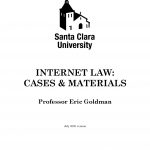
Why Are Pizzerias Arguing Whether Web Browsing Is Copyright Infringement?–Imapizza v. At Pizza
“&Pizza” runs an East Coast pizzeria chain. “@Pizza” runs a UK pizzeria chain. Let’s disregard that both brands are terrible (the & and @ symbols plus the generic term–UGH) and that @Pizza may not own its eponymous Twitter account (the…

Announcing the 2020 Edition of My Internet Law Casebook
I’m pleased to announce this year’s edition of my Internet Law casebook, Internet Law: Cases & Materials. It’s available as a PDF at Gumroad for $10, as a Kindle book for $9.99, and in hard copy at Amazon for $20. [Regarding the hard copy:…
Q2 2020 Quick Links (Everything)
Copyright * Sony Music Entertainment v. Cox Communications, Inc., 2020 WL 3121306 (E.D. Va. June 2, 2020). Each downloaded song file generally can support its own statutory damage, but “compilations” only get one statutory damages award, and no double-counting of…

Court Can’t Compel Twitter to Shut Down Trump’s Account
This lawsuit involves the @realdonaldtrump Twitter account. Has any Twitter account ever generated more litigation? The plaintiffs allege that Twitter did not properly enforce its TOS against the account. The plaintiff sought two types of relief: (1) a declaration that…

Emojis Keep Teen Out of Jail–State v. DRC
Tomorrow is World Emoji Day (named because most calendar emojis depictions show July 17 on the calendar). To celebrate the power of emojis, I’m blogging a case where emojis helped a teen avoid jail. DRC and her mom were having…

Trump’s Twitter Tantrums Are Affecting How Judges Evaluate Online Discourse–US v. Cook
The state unsuccessfully prosecuted Cook for drug offenses. “Not content to quietly accept his victory, Cook made disparaging remarks on the internet about various players in his Calhoun County prosecution.” The government prosecuted him again, this time for the federal…
California’s Effort to Suppress the Publication of Age Information Violates the Constitution–IMDb v. Becerra
IMDb has a subscription service, where subscribers can remove their age from their personal profiles (this feature wasn’t at issue in this case), and a free service, where IMDb displays an actor’s age (compiled from unspecified sources) even if the…
Unhappy Google Advertiser’s Lawsuit Completely Falls Apart–Dreamstime v. Google
This is one of several lawsuits by unhappy Google advertisers, each claiming that Google screwed them out of Google’s self-interest. (A reminder that advertisers always feel screwed because they believe they deserve more customers for less money). Anti-Google lawsuits tend…

“Shitty Media Men” List Operator Doesn’t Qualify for Section 230 (Yet)–Elliott v. Donegan
[Note: I will blog the Senate Judiciary Committee’s EARN IT bill in a blog post next week, after I stop crying.] This case involves a Google spreadsheet called “Shitty Media Men,” created by the defendant. The defendant’s goal was to…

Want to Learn More About Section 230? A Guide to My Work (UPDATED)
I’ve written a lot on Section 230 over the years. I thought it might be helpful to provide a narrated and highly selective bibliography: The Basics An Overview of the United States’ Section 230 Internet Immunity. This is the one-stop…
